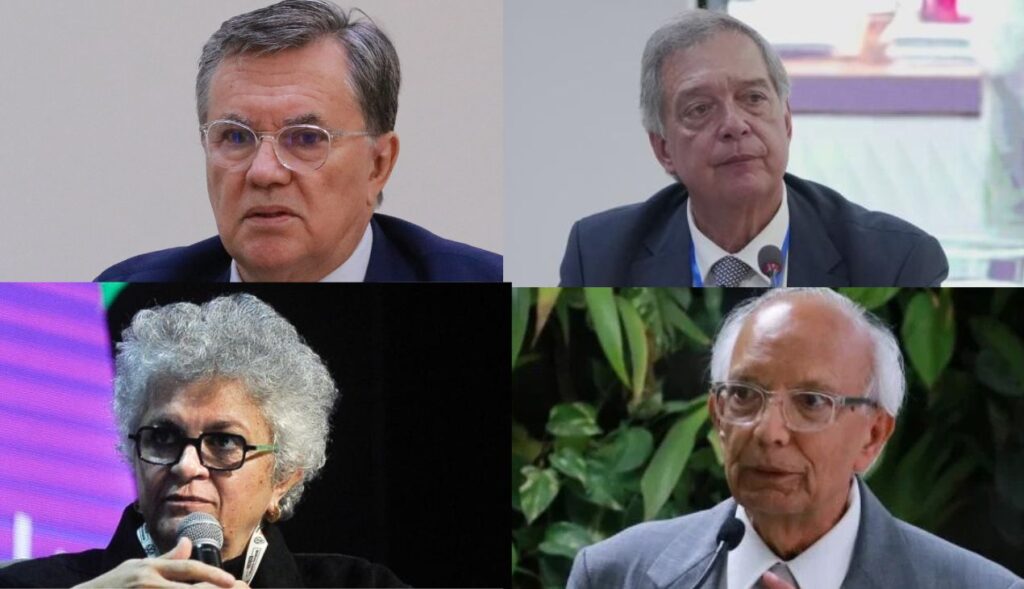
San José, 4 December 2024 (IICA) – The Inter-American Institute for Cooperation on Agriculture (IICA) will outline a roadmap ahead of COP30, to be held next year in Brazil, aiming to position the agricultural sector as essential to global food, energy, and climate security.
This was one of the agreements reached during a high-level dialogue where IICA Director General Manuel Otero reviewed the outcomes of COP29—recently held in Baku—alongside three prominent figures to critically analyze the current and future state of environmental negotiations and their link to agriculture.
The discussion included Fernando Mattos, Minister of Livestock, Agriculture, and Fisheries of Uruguay and Chair of the Inter-American Board of Agriculture (IABA), IICA’s highest governing body; Izabella Teixeira, former Minister of Environment of Brazil and the country’s chief negotiator at COP21, where the historic Paris Agreement was adopted; and Professor Rattan Lal, a global leader in regenerative agriculture and soil science, World Food Prize laureate, and IICA Goodwill Ambassador.
The three participants emphasized IICA’s vital role in developing an agenda for COP30 that highlights agriculture’s irreplaceable role in supporting global food and energy security. They also called for greater attention to the transformation the sector is undergoing, with science and new technologies playing a central role.
Mattos proposed that IICA convene a meeting of agriculture ministers, alongside private sector representatives, academia and other stakeholders, to advance efficient collaboration with Brazil, the host country of COP30, ensuring a robust positioning of agricultural issues in Belém.
Agriculture at COP29 and COP30
The Azerbaijani capital recently hosted 65,000 participants from nearly 200 countries at the United Nations Climate Change Conference, where IICA and its partners showcased advancements toward greater sustainability and resilience at their pavilion, the “Home of Sustainable Agriculture of the Americas.”
The next edition of the world’s largest environmental negotiation forum will take place late next year in Belém do Pará, Brazil, at the mouth of the Amazon River.
Agriculture is expected to take a central role at COP30, considering Brazil’s position as one of the world’s leading food producers. This could foster global political will to accelerate the green transition, marking a shift from the last two COPs, which were held in major oil and gas-producing countries (the United Arab Emirates and Azerbaijan).
“The climate agenda is at a crossroads. We still don’t see light at the end of the tunnel. We know where we want to go, but we face challenges in figuring out how to get there,” said Otero.
“At COP29, $300 billion in annual financing was pledged for mitigation and adaptation in developing countries. However, we must ask why so little funding reaches agriculture when the sector is said to be a global priority,” Otero questioned.
Active Participation
Minister Mattos welcomed Brazil’s hosting of COP30 as “excellent news,” stressing that “we must build an agenda of support and active participation, as agriculture and food security must take on a more prominent role, given Brazil’s status as an agricultural powerhouse.”
He praised IICA’s initiative of bringing the voice of agriculture from the Americas to the environmental negotiations in Azerbaijan for the third consecutive year. He noted that Brazil’s hosting of COP30 is a significant opportunity for Latin American countries to foreground the importance of balancing the three dimensions of sustainability—economic, social, and environmental.
“The outcomes of COP29 were not a total failure, as the presidency managed to secure last-minute agreements that provide some hope,” Mattos stated. “However, the challenges ahead are immense. COP30 presents a unique opportunity to strengthen food security and agriculture, provided we coordinate our strategy with Brazil, learn from recent COPs, and involve more private sector stakeholders.”
Izabella Teixeira emphasized that discussions on climate change mitigation and adaptation are fundamentally political, as they relate to development. “Moreover,” she added, “we are no longer talking about something in the future; the impacts are already here.”
Teixeira, IICA’s Special Advisor for the G20 and COP29 and COP30, noted that the results from Baku were less favorable than expected, with no progress in strategies to enhance climate action ambitions. “At COP28 in Dubai, the need to accelerate the transition away from fossil fuels was underscored. In Azerbaijan, there was resistance to this,” she said.
Teixeira highlighted the insufficiency of the new collective climate finance goal for vulnerable countries’ needs and the challenges posed by the current international geopolitical landscape.
“The way in which Brazil manages the outcomes from Baku will prove crucial to shape the COP30 agenda,” Teixeira stressed. “This includes incorporating agriculture into the discussions. We have a remarkable opportunity and a significant challenge. Agriculture must be a key element.”
She underscored the need for the region to work cohesively on building a new narrative that positions agriculture as a solution to global challenges, guided by science.
IICA’s Leadership
Professor Lal highlighted IICA’s continued efforts to bring Latin America and the Caribbean’s perspectives to COP29 in Baku, which he deemed a resounding success.
The 2020 World Food Prize laureate emphasized that many Latin American countries are global leaders in food production and conservation practices, such as no-till farming, cover cropping, and soil carbon sequestration.
Lal reiterated that agriculture could be a solution for addressing a changing climate and advocated for recognizing carbon as a commodity, rewarding farmers for implementing sustainable practices.
“COP30 in Brazil will be a critical opportunity to spotlight the success of bioethanol production in the country, a powerful tool for accelerating the phase-out of fossil fuels. Agriculture must demonstrate its role as part of the solution, with IICA playing a leadership role in achieving this goal,” Lal concluded.
More information:
Institutional Communication Division.
comunicacion.institucional@iica.int











